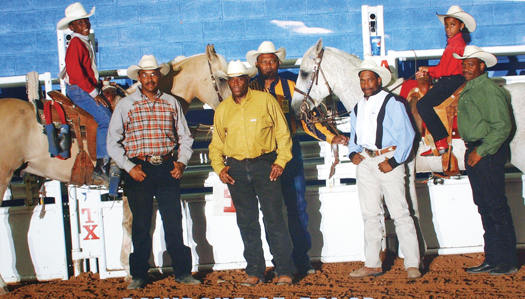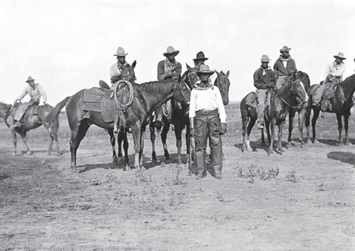The legacy of the Black cowboy—from the Old West to Lil Nas X
By Jihad Hassan Muhammad, Contributing Writer | Last updated: Jun 12, 2019 - 10:29:06 AMWhat's your opinion on this article?

Members of the Cowboys of Color Rodeo. Photo: Cowboys of Color Rodeo
|
DALLAS—The popularity of the Black cowboy has come front and center over the last several weeks with the hit song “Old Town Road” by up and coming hip-hop artist Lil Nas X, featuring country music veteran, Billy Ray Cyrus. The song is number one on the Billboard charts with a record making 143 million streams reported in just one week.
The song has been called by some observers, the number one song in the world. However, as much as “Old Town Road” bombards listeners, the tunes release was not without its challenges due to race and the mindset of White supremacy. Initially, the same Billboard charts removed the song from its country music charts for not embracing enough elements of today’s country music. How could a song with lyrics that speak to the cowboy hat, horse and tractor riding man who also loss his baby, not be enough elements of country?
Listeners might say, what could be more country than a cowboy losing his love, farming and then riding his horse? Is it because the song was performed by a 20-yearold young, Black man from Atlanta over a hip-hop/trap beat? Analysts of history argue this has been the ongoing mantra as it relates to Black people and the cowboy/county Western culture, never acknowledged and often totally replaced by those who would steal the culture and make it their own.

Lil Nas X
|
Dr. Hill says that if one depends on the images from movies, TV and mainstream media, the ever-present thought would be that Black people simply did not exist in the time of the Old West.
According to Dr. Hill, the term ‘cowboy’ was taken from Black men along with the swagger and glory of a strenuous job of taming horses and commanding any other beast on the farm. The term was stolen by their White counterparts who made the lassoing horses and controlling of steers they observed Black men do with style and grace—an aspect of the whitewashed myth they popularized the term ‘cowboys.’
“Remember we always did the hard work the White man did not want to do. He wasn’t taming wild cows and animals, he did not want to do it and the White man did not have had the intellectual ability to do so either,” argued Dr. Hill.
Dr. Hill presented the famous cowboy mythology, “The Lone Ranger” as an example. “The basis for the Lone Ranger was a Black man who brought justice in the West named Bass Reeves. Reeves would later be memorialized in Oklahoma where he was from with a city named Reeves Edition. Dr. Hill also views the mainstreams initial denial of Lil Nas X’s “Old Town Road” parallel to a White supremacy mindset that dictates what is or isn’t authorized by White people.

Historic photo of Black cowboys Photo: Wikimedia Commons
|
“Country music derived from the Blues, which they (Whites) took. They did not originate it,” said Dr. Hill.
The professor noted that like so many other moments in history the advent cowboy culture has been whitewashed. She says that Black rodeos like the “Cowboys of Color” are so important to Black history because they provide an image keeping true to the real cowboy experience.
Eighty-one-year-old, Cleo Hearn lives the cowboy life daily. He keeps Bill Pickett’s idea of a Black rodeo alive. Pickett became a mainstay in rodeos when a steer got loose and began to run toward the audience. Pickett leaped onto the steer and bit his lip until it submitted and was tamed. The method is now called bulldogging and is present in rodeos throughout the world.
“He was my influence in forming the ‘Cowboys of Color,’” said Mr. Hearn. He said after Pickett did this, it became a famous feat to achieve by cowboys and rodeo performers alike. Mr. Hearn agrees that the original cowboys were Black men.
“They (Whites) were called cow hands or field hands, we (Blacks) were called cowboys,” explained Mr. Hearn. Mr. Hearn is a member of the Professional Rodeo Cowboy Association since 1959. He began producing rodeos in 1971. In 1995 he changed the name from Texas Black Rodeo, to Cowboys of Color Rodeo to include Native Americans and Latino communities. Mr. Hearn believes that Lil Nas X’s song is great for the culture of cowboys and would love to include him on his rodeo tour which is designed to educate while entertaining its audience.
Dallas-based filmmaker and producer, Coy Poitier teaches youth the history and the culture of Black cowboys with the assistance of local Black cowboys in the predominantly-Black Dallas suburb of Lancaster, Texas.
“One third of the cowboys in the West in the 1800s were Black men. It’s so much rich history out here that has been hidden,” said Mr. Poitier. “I was a Western fan, but I never saw this on TV,” said Mr. Poitier. He refers to the Black cowboy culture as the urban West.
Mr. Poitier shared a premise that the term ‘Black cowboy’ is redundant and that the term was reserved historically for just Blacks. “It was a derogatory term that Black people made positive by our talents, and now the world uses it,” he explained.
Lil Nas X may help bring about a whole new generation that will be cowboys, engaging in agriculture and the “Old West,” lifestyle. In Dallas, ‘cowboys’ are alive and well—not playing football—but riding down the urban streets of the city on horseback wearing cowboy hats and boots or tilling their land for future crops.
INSIDE STORIES AND REVIEWS
-
-
About Harriett ... and the Negro Hollywood Road Show
By Rabiah Muhammad, Guest Columnist » Full Story -
Skepticism greets Jay-Z, NFL talk of inspiring change
By Bryan 18X Crawford and Richard B. Muhammad The Final Call Newspaper @TheFinalCall » Full Story -
The painful problem of Black girls and suicide
By Charlene Muhammad -National Correspondent- » Full Story -
Exploitation of Innocence - Report: Perceptions, policies hurting Black girls
By Charlene Muhammad -National Correspondent- » Full Story -
Big Ballin: Big ideas fuel a father’s Big Baller Brand and brash business sense
By Bryan Crawford -Contributing Writer- » Full Story






 Click Here Stay Connected!
Click Here Stay Connected!








